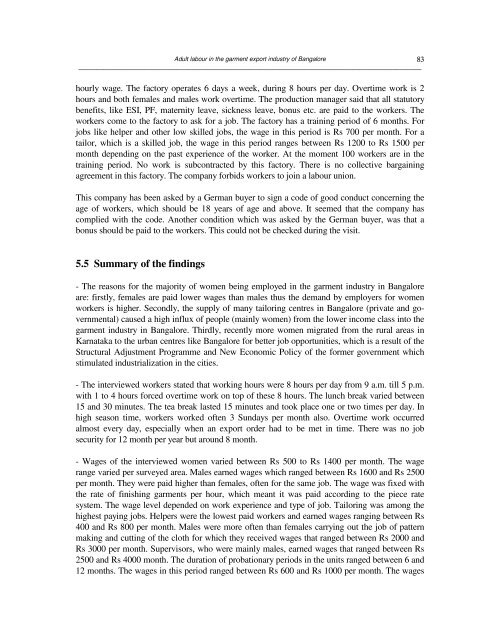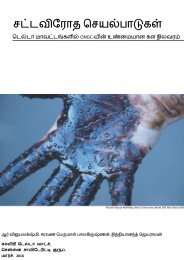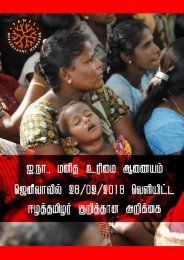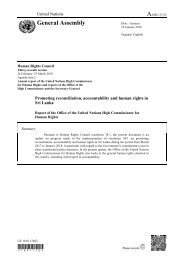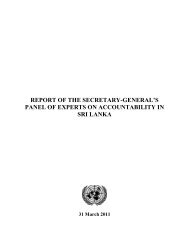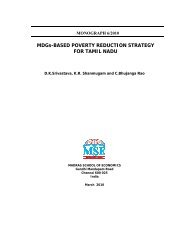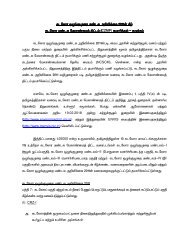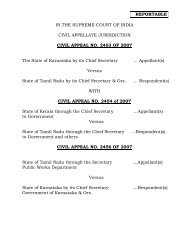You also want an ePaper? Increase the reach of your titles
YUMPU automatically turns print PDFs into web optimized ePapers that Google loves.
Adult <strong>labour</strong> <strong>in</strong> <strong>the</strong> <strong>garment</strong> <strong>export</strong> <strong>in</strong>dustry <strong>of</strong> Bangalore<br />
──────────────────────────────────────────────────────────────────────────────────────────────<br />
hourly wage. The factory operates 6 days a week, dur<strong>in</strong>g 8 hours per day. Overtime work is 2<br />
hours <strong>and</strong> both females <strong>and</strong> males work overtime. The production manager said that all statutory<br />
benefits, like ESI, PF, maternity leave, sickness leave, bonus etc. are paid to <strong>the</strong> workers. The<br />
workers come to <strong>the</strong> factory to ask for a job. The factory has a tra<strong>in</strong><strong>in</strong>g period <strong>of</strong> 6 months. For<br />
jobs like helper <strong>and</strong> o<strong>the</strong>r low skilled jobs, <strong>the</strong> wage <strong>in</strong> this period is Rs 700 per month. For a<br />
tailor, which is a skilled job, <strong>the</strong> wage <strong>in</strong> this period ranges between Rs 1200 to Rs 1500 per<br />
month depend<strong>in</strong>g on <strong>the</strong> past experience <strong>of</strong> <strong>the</strong> worker. At <strong>the</strong> moment 100 workers are <strong>in</strong> <strong>the</strong><br />
tra<strong>in</strong><strong>in</strong>g period. No work is subcontracted by this factory. There is no collective barga<strong>in</strong><strong>in</strong>g<br />
agreement <strong>in</strong> this factory. The company forbids workers to jo<strong>in</strong> a <strong>labour</strong> union.<br />
This company has been asked by a German buyer to sign a code <strong>of</strong> good conduct concern<strong>in</strong>g <strong>the</strong><br />
age <strong>of</strong> workers, which should be 18 years <strong>of</strong> age <strong>and</strong> above. It seemed that <strong>the</strong> company has<br />
complied with <strong>the</strong> code. Ano<strong>the</strong>r condition which was asked by <strong>the</strong> German buyer, was that a<br />
bonus should be paid to <strong>the</strong> workers. This could not be checked dur<strong>in</strong>g <strong>the</strong> visit.<br />
83<br />
5.5 Summary <strong>of</strong> <strong>the</strong> f<strong>in</strong>d<strong>in</strong>gs<br />
- The reasons for <strong>the</strong> majority <strong>of</strong> women be<strong>in</strong>g employed <strong>in</strong> <strong>the</strong> <strong>garment</strong> <strong>in</strong>dustry <strong>in</strong> Bangalore<br />
are: firstly, females are paid lower wages than males thus <strong>the</strong> dem<strong>and</strong> by employers for women<br />
workers is higher. Secondly, <strong>the</strong> supply <strong>of</strong> many tailor<strong>in</strong>g centres <strong>in</strong> Bangalore (private <strong>and</strong> governmental)<br />
caused a high <strong>in</strong>flux <strong>of</strong> people (ma<strong>in</strong>ly women) from <strong>the</strong> lower <strong>in</strong>come class <strong>in</strong>to <strong>the</strong><br />
<strong>garment</strong> <strong>in</strong>dustry <strong>in</strong> Bangalore. Thirdly, recently more women migrated from <strong>the</strong> rural areas <strong>in</strong><br />
Karnataka to <strong>the</strong> urban centres like Bangalore for better job opportunities, which is a result <strong>of</strong> <strong>the</strong><br />
Structural Adjustment Programme <strong>and</strong> New Economic Policy <strong>of</strong> <strong>the</strong> former government which<br />
stimulated <strong>in</strong>dustrialization <strong>in</strong> <strong>the</strong> cities.<br />
- The <strong>in</strong>terviewed workers stated that work<strong>in</strong>g hours were 8 hours per day from 9 a.m. till 5 p.m.<br />
with 1 to 4 hours forced overtime work on top <strong>of</strong> <strong>the</strong>se 8 hours. The lunch break varied between<br />
15 <strong>and</strong> 30 m<strong>in</strong>utes. The tea break lasted 15 m<strong>in</strong>utes <strong>and</strong> took place one or two times per day. In<br />
high season time, workers worked <strong>of</strong>ten 3 Sundays per month also. Overtime work occurred<br />
almost every day, especially when an <strong>export</strong> order had to be met <strong>in</strong> time. There was no job<br />
security for 12 month per year but around 8 month.<br />
- Wages <strong>of</strong> <strong>the</strong> <strong>in</strong>terviewed women varied between Rs 500 to Rs 1400 per month. The wage<br />
range varied per surveyed area. Males earned wages which ranged between Rs 1600 <strong>and</strong> Rs 2500<br />
per month. They were paid higher than females, <strong>of</strong>ten for <strong>the</strong> same job. The wage was fixed with<br />
<strong>the</strong> rate <strong>of</strong> f<strong>in</strong>ish<strong>in</strong>g <strong>garment</strong>s per hour, which meant it was paid accord<strong>in</strong>g to <strong>the</strong> piece rate<br />
system. The wage level depended on work experience <strong>and</strong> type <strong>of</strong> job. Tailor<strong>in</strong>g was among <strong>the</strong><br />
highest pay<strong>in</strong>g jobs. Helpers were <strong>the</strong> lowest paid workers <strong>and</strong> earned wages rang<strong>in</strong>g between Rs<br />
400 <strong>and</strong> Rs 800 per month. Males were more <strong>of</strong>ten than females carry<strong>in</strong>g out <strong>the</strong> job <strong>of</strong> pattern<br />
mak<strong>in</strong>g <strong>and</strong> cutt<strong>in</strong>g <strong>of</strong> <strong>the</strong> cloth for which <strong>the</strong>y received wages that ranged between Rs 2000 <strong>and</strong><br />
Rs 3000 per month. Supervisors, who were ma<strong>in</strong>ly males, earned wages that ranged between Rs<br />
2500 <strong>and</strong> Rs 4000 month. The duration <strong>of</strong> probationary periods <strong>in</strong> <strong>the</strong> units ranged between 6 <strong>and</strong><br />
12 months. The wages <strong>in</strong> this period ranged between Rs 600 <strong>and</strong> Rs 1000 per month. The wages


